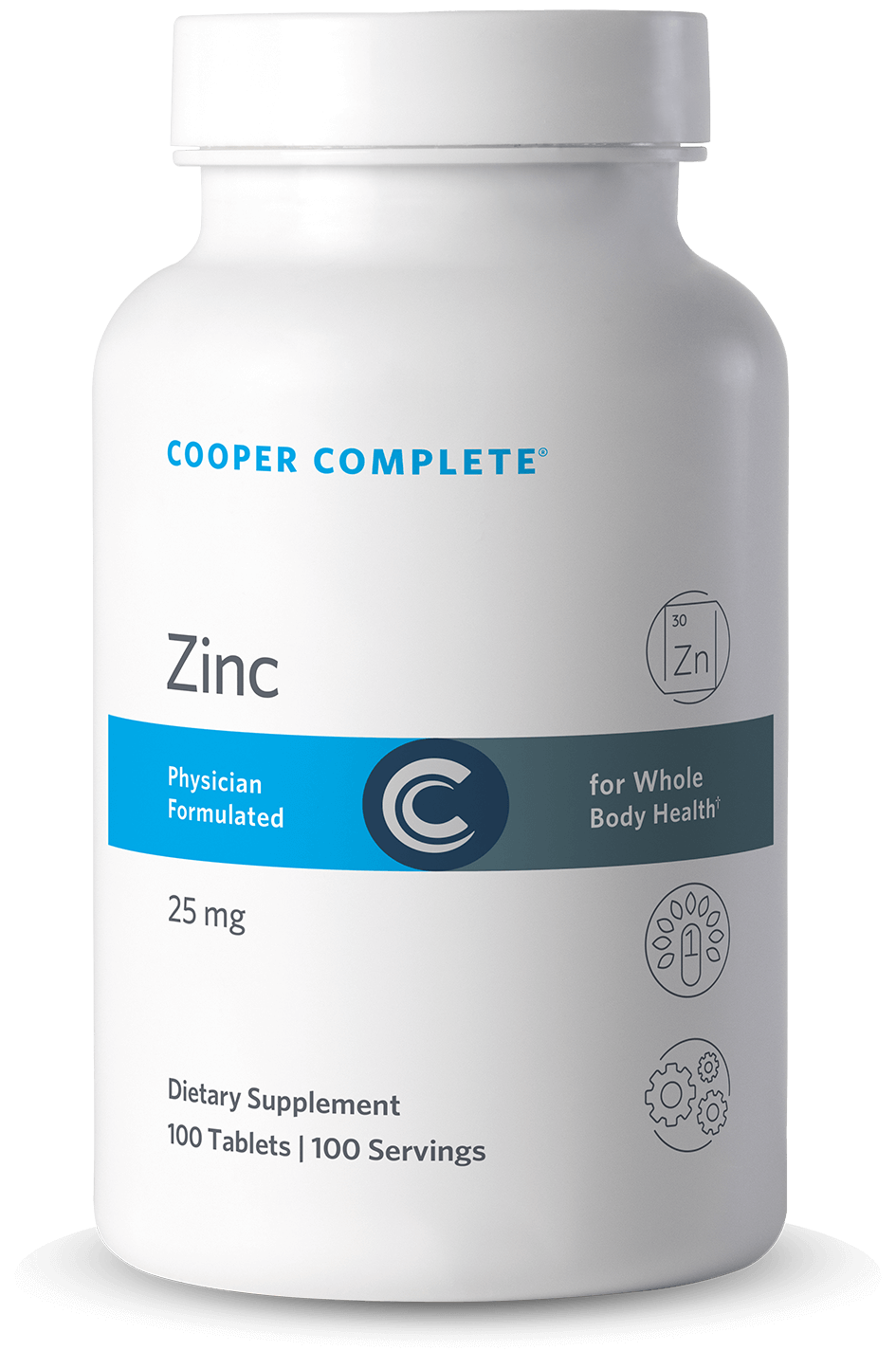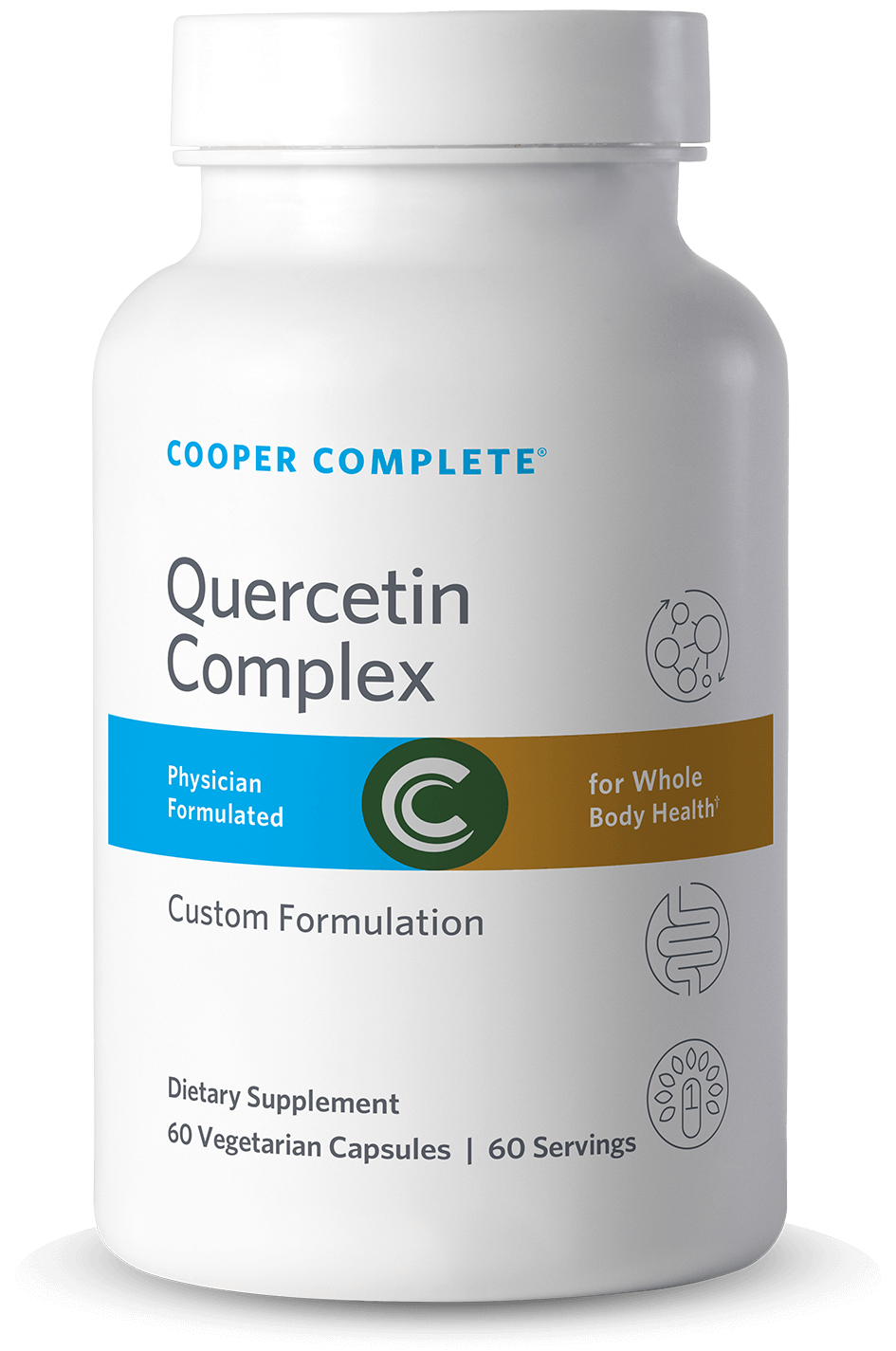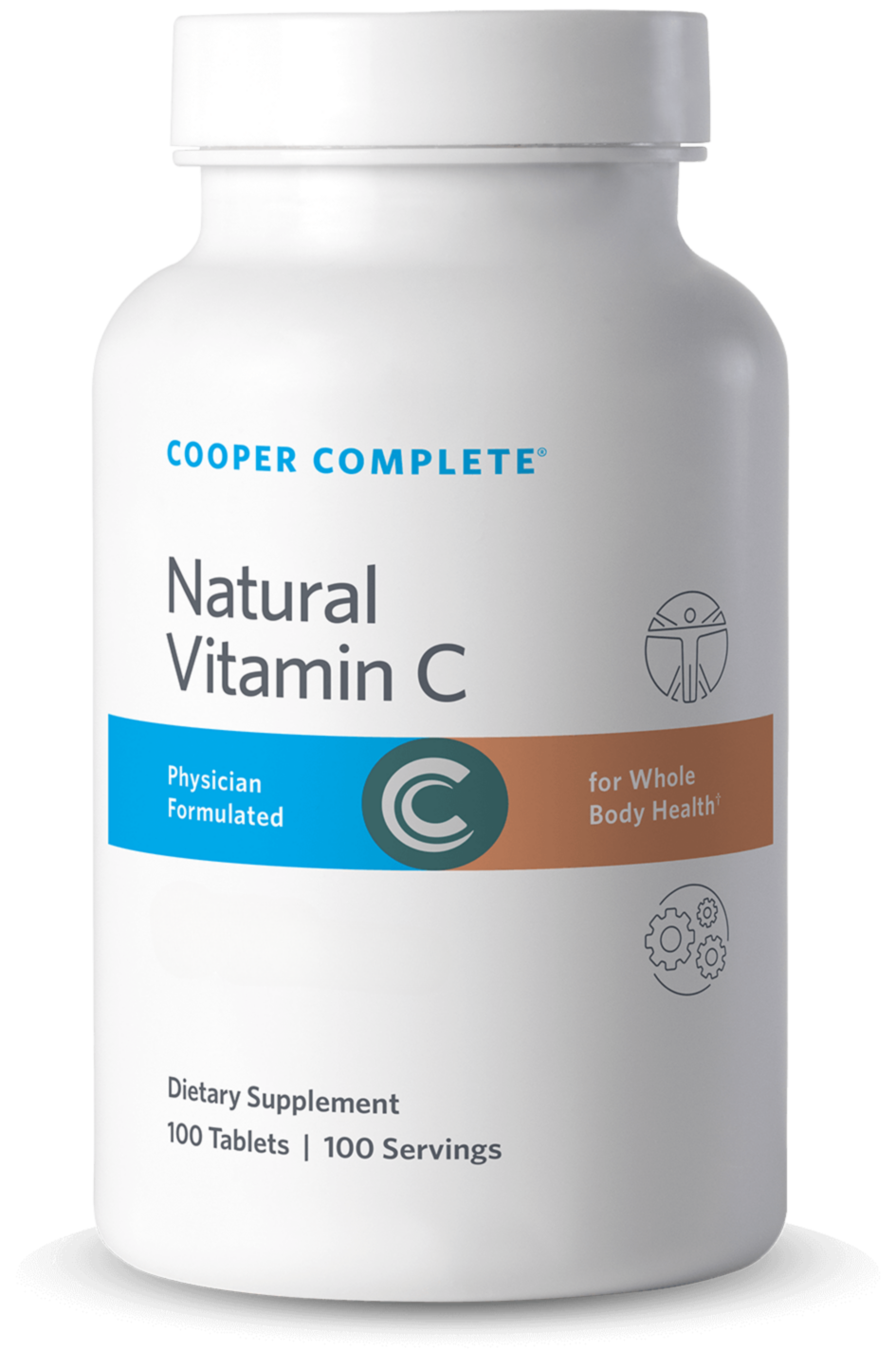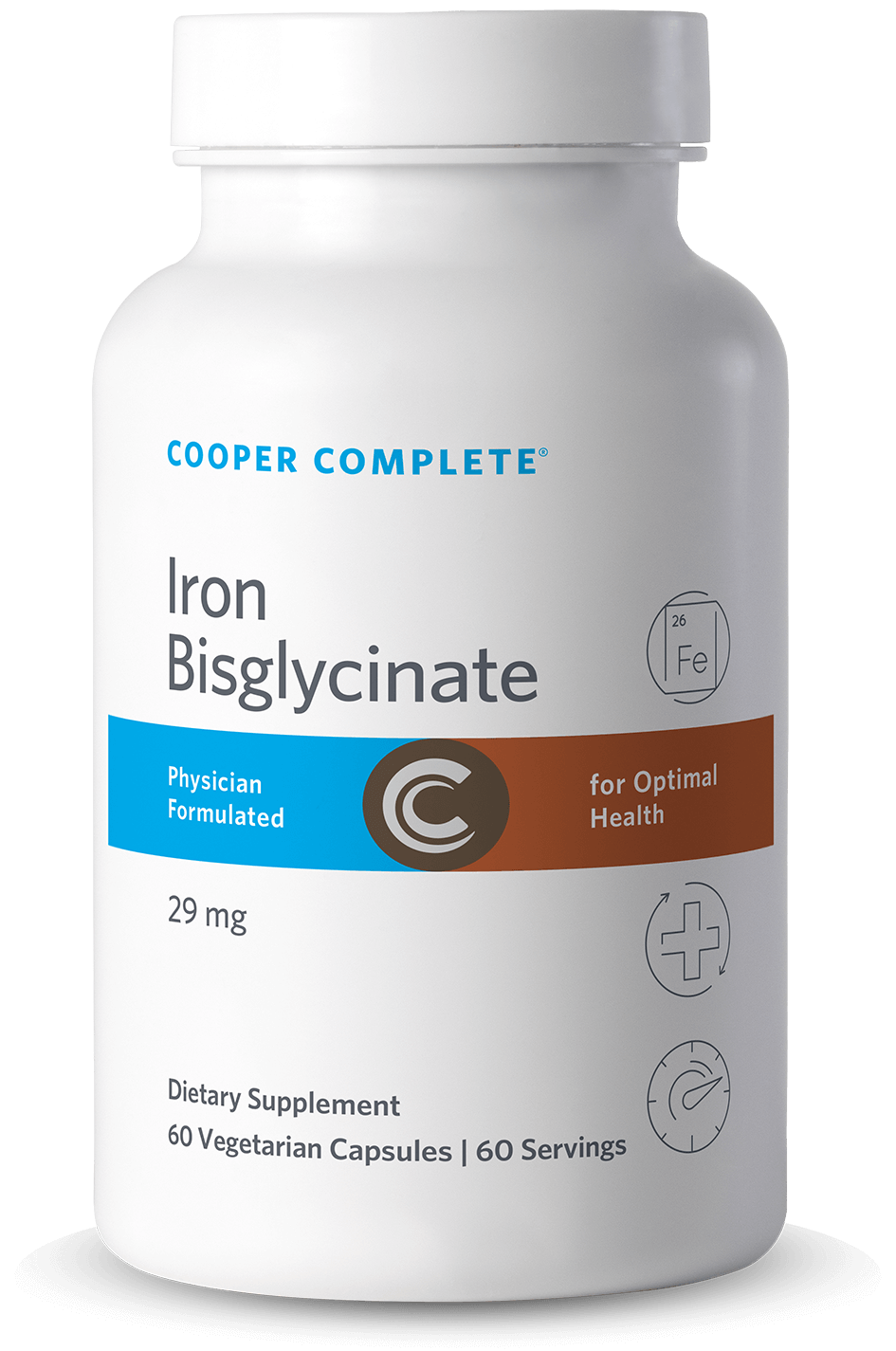Boost Your Immune Health – Dr. Cooper Shares 9 Tips

There has never been a more important time for you to concentrate on ways you can boost your immune health. Kenneth H. Cooper, MD, MPH, Founder and Chairman of Cooper Aerobics, offers suggestions on how to boost your immune health to protect yourself against acute diseases. Acute immunity is what our bodies need to protect us from infections that develop quickly, such as viral infections, influenza, colds, or even coronavirus. Below, Dr. Cooper outlines nines steps for how to boost your immune health against acute diseases. This Zinc Supplement is comprised of zinc gluconate and zinc citrate for optimal absorption. Zinc is important for muscle function, healthy aging, skin and immune health.
Zinc Supplement 25 mg
1. Exercise boosts immune health
Exercise is extremely important to help boost overall immune health. Any sustained physical activity as short as 30 minutes several times a week can have tremendous benefits. The American Heart Association called the Cooper Institute’s study published November 1989, in The Journal of the American Medical Association, “Physical Fitness and All-Cause Mortality,” the landmark study of the century. It answered the question of how much exercise is necessary.
We also showed that even minimal exercise could prevent deaths of all causes – including heart attacks, strokes, diabetes and cancer by up to 58 percent and increase longevity by up to 6 years. The Cooper Institute’s Medicare study, following 18,670 healthy adult subjects for 25 years, showed clearly that the cost of healthcare could be reduced by 40 percent by embracing an active lifestyle. In addition, those in the top category of fitness in mid-life reduced their risk of developing Alzheimer’s disease and dementia 36 percent more than those in the bottom or poor fitness category. At baseline, generally, the people in the top category of fitness were lean and trim, while those in the bottom category were overweight and inactive.
According to a 2019 Harvard Magazine article, “Could Inflammation Be the Cause of Myriad Chronic Conditions,” the author states you can have a brain full of plaques and tangles, but if you do not have inflammation, you are less likely to develop chronic diseases. This chronic inflammation is the root cause of the onset of chronic disease, but if interfered with by an anti-inflammatory such as omega-3, one can reverse this pathology. Additional factors that can cause chronic inflammation include stress, pollution, smoking, processed food, sugar and refined carbohydrates.
This essential combination of exercise and weight management proved to be a major factor in dramatically reducing the risk of Alzheimer’s disease and dementia. In addition, it was shown to reduce the frequency of congestive heart failure as well as chronic kidney disease when inflammation levels were low. Another study we conducted showed the combination of exercise and supplementing a healthy diet with Cooper Complete Advanced Omega-3 and Basic One multivitamins effective in controlling inflammation.
2. Sleep boosts immune health
Sleep plays a very important role in improving your resistance to serious illness and disease. I recommend getting seven to eight hours of sleep per night to give your body the restoration it needs to fight off infection.
Four out of five people say they suffer from sleep problems at least once a week. A recent study shows that 40 percent of people surveyed reported having more trouble than usual sleeping since the pandemic. A study from the American Academy of Sleep Medicine surveyed over 2000 adults, and 56% indicated an increase in sleep disturbances.
My colleague, Cooper Clinic physician Nina B. Radford, MD, shares practical habits that help us achieve better sleep.

Quercetin Complex Supplement
Quercefit® Quercetin Phytosome, the highly absorbable form of quercetin, the digestive enzyme bromelain, and vitamin C physician formulated to support inhibited histamine response, respiratory, and healthy immune function.†
$36.48 Add to cart3. Manage BMI for immune health
It is common knowledge that obesity affects diseases such as diabetes, cardiovascular disease, high blood pressure, high cholesterol and more. But did you know your body mass index (BMI) affects your immune health, too? Obesity causes chronic, low-grade activation of parts of the immune system. When faced with an infection, it could lead to hyper-activation of the immune system but in a detrimental way that does not fight the infection.
A study regarding COVID-19 hospitalizations in New York City revealed the number one risk factor for hospitalization was being over age 65; number two was obesity. To determine your body mass index (BMI), which should be under 25, you can calculate your BMI here. These two risk factors were more important regarding hospitalizations in the New York study than were comorbid conditions such as cardiovascular disease and pulmonary problems.
4. Eat a balanced diet to support healthy immunity
A well-balanced diet containing all food groups fuels strong immune health and reduces the risk of chronic illnesses and infectious diseases. Therefore, I encourage you to boost your immune system by eating a balanced diet with at least five servings of fruits and vegetables each day.
Vitamin C
Fruits and vegetables, especially citrus fruits, berries, tomatoes, peppers and spinach, are good sources of vitamin C. Vitamin C, also known as ascorbic acid, is well-known for its ability to support immunity. However, the body does not make or store vitamin C. So when you eat foods rich in vitamin C or take one of our vitamin C supplements, the body uses what it needs and the remainder is flushed. Vitamin C is essential for tissue repair, wound healing and fighting free radicals. Vitamin C is also necessary to form blood vessels, cartilage, muscle and collagen. To learn more about research on how a daily dose of vitamin C can benefit immunity, read Vitamin C Benefits for Immunity.
Zinc
30-50 mg of zinc per day has been shown to be essential for innate and adaptive immunity. I recommend a daily serving of nuts, such as cashews (a one-ounce serving is about ¼ cup) which provides 1.6 mg of zinc. Other foods containing high amounts of zinc include red meat and poultry, chickpeas, pumpkin seeds, cocoa powder, mushrooms and spinach. Daily intake of zinc is crucial because the body has no way of storing it. In addition, zinc is vital to immune health because it helps make proteins and DNA while also assisting in wound healing. To help you get your daily dose, Cooper Complete offers a 25 mg tablet.

Natural Vitamin C Supplement
Natural Vitamin C Supplement contains 850 mg of vitamin C (as calcium and magnesium ascorbates), plus citrus bioflavonoids to support cells, immune health, and healing.†
$29.98 Add to cart5. Hydration is a key element in a healthy immune system
Staying well-hydrated is another essential component to support your immune system. Drink a lot of water! Hydration is particularly critical in the summer months to keep your internal organs functioning properly, which keeps your immunity strong against acute and chronic diseases. Do not rely on soft drinks, fruit juices or other types of beverages. Are you drinking enough water? If you’re unsure, learn about how much water Cooper Clinic recommends.
6. Supplements to support immune health
The value of vitamin D and building your immunity against respiratory diseases is something I continue to be excited about. Research from Northwestern University in Chicago analyzed data from hospitals and clinics around the world early in the pandemic. The research showed countries with the highest number of COVID-19 cases, such as Italy, Spain and the United Kingdom, had lower vitamin D levels than countries not as severely affected. This study showed that vitamin D levels might impact COVID-19 mortality rates by suppressing cytokine storms in COVID-19 patients. It also proves that vitamin D enhances our innate immune systems and prevents them from becoming dangerously overactive. Researchers suggest having healthy levels of vitamin D could protect patients against severe complications, including death, from COVID-19.
A study in the British Medical Journal from 2018 recommends vitamin D levels should be above 25. A second study from Australia suggests vitamin D blood levels be between 50-100 to provide maximum protection against respiratory viruses. I strongly recommend a vitamin D level of 50 or greater for my patients.

Iron Bisglycinate Supplement 29 mg
Iron Bisglycinate Supplement contains 29 mg of gentle and highly absorbable Ferrochel® (a patented chelated iron in the form of iron bisglycinate) intentionally designed to avoid gastric upset or constipation.
$16.98 Add to cartI suggest taking a daily vitamin supplement, specifically our Cooper Complete® Basic One. In addition to 50 mcg (2,000 IU) of vitamin D3, this multivitamin has excellent levels of B vitamins, magnesium, 150 mg of vitamin C and 15 mg of zinc, all of which can be important in helping boost immune health.
Vitamin E
Vitamin E is a potent antioxidant and one of the most effective nutrients to modulate the immune system by helping ward off bacteria and viruses. It is found in nuts, primarily almonds, hazelnuts, pine nuts, sunflower seeds, and vegetable oil. All five Cooper Complete multivitamins contain Vitamin E.
Iron
Iron and immunity go hand in hand. As a key component in the development of the immune system itself, it contributes to the reproduction and maturity of immune cells. This mineral also assists in the transfer of oxygen from the lungs to the body’s tissues. Getting enough iron can be a delicious experience as it is found in spinach, soybeans, oysters, dark chocolate, sesame seeds, chickpeas, tofu, cashews, almonds, and quinoa. Iron is offered in both our Original and Basic One multivitamin formulas and as a standalone mineral in Time Release Iron. Consult your physician before taking supplemental iron to see if supplemental iron is recommended.
Quercetin
Research has shown that quercetin (kwur-seh-tn), a polyphenol micronutrient derived from plants, has a wide range of biological actions. This includes anti-carcinogenic, anti-inflammatory and antiviral activities and helps reduce infection risk. Quercetin is found in its highest concentrations in capers. Cruciferous vegetables, berries, green and black tea, and many seeds and nuts also contain quercetin. More about the top benefits of quercetin can be found in this article.
7. Smoking harms the immune system
I recommend refraining from using tobacco in any form. There is no way you can safely use tobacco. Smoking of any kind and secondhand smoke can be very dangerous to your immune system. This is especially true in this time of increased susceptibility to disease. You want to live in a smoke-free environment. If you smoke, try to stop smoking or strive to reduce the number of times you smoke each day.
8. Too much alcohol harms the immune system
If you consume too much alcohol, it can certainly bring down your immunity and make you more susceptible to infections.
The British journal, Lancet, published a study in 2019, showing that if men were to drink two drinks per day, it would shorten their lifespan by one and a half to two years. The researchers strongly recommend men and women, if they drink, drink no more than one drink per day because of the long list of medical problems associated with consuming too much alcohol. I personally do not drink and encourage you not to drink. If you do drink, I encourage you to limit your alcohol consumption to boost your immune health. Click here to read the article, Alcohol use and burden for 195 countries and territories, 1990-2016: a systematic analysis for the Global Burden of Disease Study 2016.
In response to stress and anxiety, many people cope with alcohol. In the first week of the pandemic, Nielsen reported a 54% increase in national alcohol sales. The World Health Organization was quick to warn that alcohol use may heighten health concerns. There have been many surveys during the pandemic, and many have seen increases in consumption linked to increases in stress. My final step suggests better and healthier ways to respond to stress than drinking.
9. Manage stress to boost immune health
Another way to positively affect your immunity is to manage stress. One study showed that people under stress had an increased risk of a respiratory infection, such as a cold. Stress increases the level of cortisol, which is one of the stress responses that drops your immunity. One way I control stress in my life is by exercising at the end of the day, which helps me sleep at night and enables me to build my immunity. Activities such as yoga and meditation can also help control stress. Dr. Herbert Benson’s book, The Relaxation Response, offers techniques to control stress, including proper breathing. For more information on stress management, watch this video from Meridan Zerner, MS, RD, CSSD, LD, for her recommendations, or read six tips for ways to lower your stress response quickly.
I am encouraging my patients to practice these important recommendations. At 90 years of age, I control my weight and diet, don’t consume alcohol, and walk two to three miles per day. Up to this point, I have certainly enjoyed good health.
If you aren’t doing these things now, it is important to start immediately to boost your immune health to protect yourself against viruses. There is always going to be another coronavirus in the future. Now is the time to boost immune health by following these recommendations, which hopefully will protect you from acute diseases.
